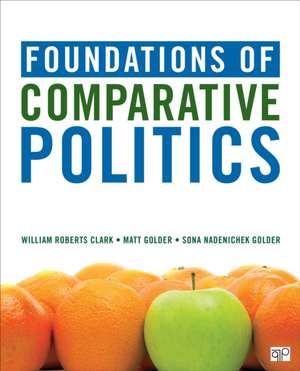Foundations of Comparative Politics
Autor William Roberts Clark, Matthew R. Golder, Sona N. Golderen Limba Engleză Paperback – 13 noi 2018
Preț: 841.80 lei
Preț vechi: 1153.14 lei
-27% Nou
Puncte Express: 1263
Preț estimativ în valută:
161.09€ • 167.17$ • 134.65£
161.09€ • 167.17$ • 134.65£
Carte tipărită la comandă
Livrare economică 18 martie-01 aprilie
Preluare comenzi: 021 569.72.76
Specificații
ISBN-13: 9781506360737
ISBN-10: 1506360734
Pagini: 408
Dimensiuni: 191 x 232 mm
Greutate: 0.79 kg
Ediția:First Edition
Editura: SAGE Publications
Colecția CQ Press
Locul publicării:Washington DC, United States
ISBN-10: 1506360734
Pagini: 408
Dimensiuni: 191 x 232 mm
Greutate: 0.79 kg
Ediția:First Edition
Editura: SAGE Publications
Colecția CQ Press
Locul publicării:Washington DC, United States
Cuprins
PART
I:
What
is
Comparative
Politics?
1: INTRODUCTION
Overview of the Book
The Approach Taken in This Book
Key Concepts
2: WHAT IS SCIENCE?
What is Science?
The Scientific Method
An Introduction to Logic
Myths About Science
Conclusion
Key Concepts
3: WHAT IS POLITICS?
The Exit, Voice, and Loyalty (EVL) Theory of Politics
What Happens in the EVL Theory?
Insights from the EVL Theory
Conclusion
Key Concepts
PART II: The Modern State: Democracy or Dictatorship?
4: THE ORIGINS OF THE MODERN STATE
What is a State?
Syria: A Failed State
The Contractarian View of the State
The Predatory View of the State
Conclusion
Key Concepts
5: THE ECONOMIC DETERMINANTS OF DEMOCRACY AND DICTATORSHIP
Democracy in Historical Perspective
Modernization Theory and Democracy
A Variant of Modernization Theory
Conclusion
Key Concepts
6: CULTURAL DETERMINANTS OF DEMOCRACY AND DICTATORSHIP
Classical Cultural Arguments: Mill and Montesquieu
Does Democracy Require a Civic Culture?
Are Some Religions Incompatible with Democracy?
Experiments and Culture
Conclusion
Key Concepts
7: DEMOCRATIC TRANSITIONS
Bottom-Up Transitions to Democracy
Top-Down Transitions to Democracy
Conclusion
Key Concepts
PART III: Varieties of Democracy and Dictatorship
8: VARIETIES OF DICTATORSHIP
A Common Typology of Authoritarian Regimes
The Two Fundamental Problems of Authoritarian Rule
Selectorate Theory
Conclusion
Key Concepts
9: PROBLEMS WITH GROUP DECISION MAKING
Problems with Group Decision Making
The Median Voter Theorem and the Party Competition
Arrow's Theorem
Conclusion
Key Concepts
10: PARLIAMENTARY, PRESIDENTIAL, AND SEMI-PRESIDENTIAL DEMOCRACIES
Classifying Democracies
Governments in Parliamentary Democracies
Governments in Presidential Democracies
Governments in Semi-Presidential Democracies
Conclusion
Key Concepts
11: ELECTIONS AND ELECTORAL SYSTEMS
Elections and Electoral Integrity
Electoral Systems
Legislative Electoral System Choice
Conclusion
Key Concepts
12. SOCIAL CLEAVAGES AND PARTY SYSTEMS
Political Parties: What Are They, and What Do They Do?
Party Systems
Where Do Parties Come From?
Types of Parties and Social Cleavages
Number of Parties: Duverger's Theory
Conclusion
Key Concepts
13: INSTITUTIONAL VETO PLAYERS
Federalism
Bicameralism
Constitutionalism
Veto Players
Conclusion
Key Concepts
PART IV: Varieties of Democracy and Political Outcomes
14: CONSEQUENCES OF DEMOCRATIC INSTITUTIONS
Majoritarian or Consensus Democracy
Political Representation
The Effect of Political Institutions on Fiscal Policy
Electoral laws, Federalism, and Ethnic Conflict
Presidentialism and Democratic Survival
Conclusion
Key Concepts
Problems
References
1: INTRODUCTION
Overview of the Book
The Approach Taken in This Book
Key Concepts
2: WHAT IS SCIENCE?
What is Science?
The Scientific Method
An Introduction to Logic
Myths About Science
Conclusion
Key Concepts
3: WHAT IS POLITICS?
The Exit, Voice, and Loyalty (EVL) Theory of Politics
What Happens in the EVL Theory?
Insights from the EVL Theory
Conclusion
Key Concepts
PART II: The Modern State: Democracy or Dictatorship?
4: THE ORIGINS OF THE MODERN STATE
What is a State?
Syria: A Failed State
The Contractarian View of the State
The Predatory View of the State
Conclusion
Key Concepts
5: THE ECONOMIC DETERMINANTS OF DEMOCRACY AND DICTATORSHIP
Democracy in Historical Perspective
Modernization Theory and Democracy
A Variant of Modernization Theory
Conclusion
Key Concepts
6: CULTURAL DETERMINANTS OF DEMOCRACY AND DICTATORSHIP
Classical Cultural Arguments: Mill and Montesquieu
Does Democracy Require a Civic Culture?
Are Some Religions Incompatible with Democracy?
Experiments and Culture
Conclusion
Key Concepts
7: DEMOCRATIC TRANSITIONS
Bottom-Up Transitions to Democracy
Top-Down Transitions to Democracy
Conclusion
Key Concepts
PART III: Varieties of Democracy and Dictatorship
8: VARIETIES OF DICTATORSHIP
A Common Typology of Authoritarian Regimes
The Two Fundamental Problems of Authoritarian Rule
Selectorate Theory
Conclusion
Key Concepts
9: PROBLEMS WITH GROUP DECISION MAKING
Problems with Group Decision Making
The Median Voter Theorem and the Party Competition
Arrow's Theorem
Conclusion
Key Concepts
10: PARLIAMENTARY, PRESIDENTIAL, AND SEMI-PRESIDENTIAL DEMOCRACIES
Classifying Democracies
Governments in Parliamentary Democracies
Governments in Presidential Democracies
Governments in Semi-Presidential Democracies
Conclusion
Key Concepts
11: ELECTIONS AND ELECTORAL SYSTEMS
Elections and Electoral Integrity
Electoral Systems
Legislative Electoral System Choice
Conclusion
Key Concepts
12. SOCIAL CLEAVAGES AND PARTY SYSTEMS
Political Parties: What Are They, and What Do They Do?
Party Systems
Where Do Parties Come From?
Types of Parties and Social Cleavages
Number of Parties: Duverger's Theory
Conclusion
Key Concepts
13: INSTITUTIONAL VETO PLAYERS
Federalism
Bicameralism
Constitutionalism
Veto Players
Conclusion
Key Concepts
PART IV: Varieties of Democracy and Political Outcomes
14: CONSEQUENCES OF DEMOCRATIC INSTITUTIONS
Majoritarian or Consensus Democracy
Political Representation
The Effect of Political Institutions on Fiscal Policy
Electoral laws, Federalism, and Ethnic Conflict
Presidentialism and Democratic Survival
Conclusion
Key Concepts
Problems
References
Descriere
Adapted
from
the
groundbreaking Principles
of
Comparative
Politics, now
in
its
third
edition, Foundations
of
Comparative
Politics presents
a
scientific
approach
to
the
rich
world
of
comparative
inquiry,
research,
and
scholarship,
providing
students
a
guide
to
cross-national
comparison
and
why
it
matters
to
them. Foundations introduces
students
to
the
key
questions
in
comparative
politics
using
tools
such
as
decision,
social
choice,
and
game
theory
to
help
them
understand
clearly
why
some
explanations
for
political
phenomena
are
stronger
than
others. The
core
material
of Principles has
been
condensed
by
almost
40%
into
a
briefer,
more
accessible
format
that
not
only
resonates
with
students
but
also
allows
instructors
to
more
easily
cover
all
material
in
a
single
semester.
Fourteen
chapters
have
been
updated
and
pared
down
to
present
only
the
most
necessary
information
enhanced
with
plentiful
visual
features
and
connections
to
real-world
examples.
